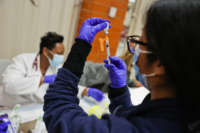
When Cherriese Thompson heard the Centers for Disease Control and Prevention’s decision last week to cut quarantine time down from 10 days to five days, she was upset. At a time when hospitalizations were surging and isolation and quarantine procedures were already tricky for people to understand, Thompson, a third-year medicine resident in Northern California, felt the short quarantine window would only add confusion and put more people at risk of contracting the highly contagious Omicron variant.
“It’s just so upsetting,” Thompson said. “I feel like this is going to end up fueling the surge even more. It’s come to the point that we value money more than we value people’s livelihoods.”
The CDC made the decision to reduce the amount of time asymptomatic people with COVID-19 infections have to quarantine in order to ease labor shortages for the stressed airline industry. But health care workers say the new guidelines are ignoring their needs when hospitals are already in the midst of a surge and dealing with critical staffing shortages. Now, they say shorter quarantine times could only add to an already stressed health care system and disproportionately impact BIPOC health care workers and patients.
A recent study by Mercer found that the U.S. is facing a severe health care worker shortage and that by 2025 the country will lose approximately 29,400 nurse practitioners. The U.S. Bureau of Labor Statistics reported in December that hospitals had lost 9,000 jobs during October alone. Since the beginning of the pandemic, health care employment has dropped by 524,000. According to the World Health Organization, about 115,000 health care workers died from COVID-19 between January 2020 to May 2021. In Los Angeles County alone, more than 49,000 health care workers and first responders have been sick with the virus since February 2020. According to data collected by Fierce Healthcare, about 11,000 health care workers in 58 health care systems across the country have been fired or resigned due to a refusal to meet vaccine mandates.
On the same day the guidance was issued, Thompson began developing symptoms of COVID-19. She had visited family in Maryland over the holidays when her grandmother developed some symptoms. She’d received her booster shot of the vaccine, but her grandmother was still experiencing a high fever and Thompson had to consider taking her to the hospital. But, being a Black Jamaican woman, Thompson was unsure her grandmother would receive the best care possible due to the implicit racial bias that makes white health care workers less likely to believe Black patients. In a 2003 study by the National Academy of Medicine, they found that “racial and ethnic minorities receive lower-quality health care than white people — even when insurance status, income, age, and severity of conditions are comparable.”
“I was terrified to take her to the hospital,” Thompson said. “I was thinking, ‘At least I’m the best person to advocate for her because I’m in health care,’ but we’re still Black women.”
Thompson was eventually able to break her grandmother’s fever at home and give her the care she needed so that her health improved, but by the time she got back to California, her father began developing symptoms as well.
“I’m going to need to fly over there and advocate for my dad,” Thompson said. “I’ve witnessed the disparities in the micro- and macroaggressions and the inadequate care that people of color have experienced, in general, and then exacerbated by COVID.”
On Friday, Dec. 31, Thompson considered taking herself to the hospital because her oxygen levels dropped to 92% and she was short of breath. Fortunately, Thompson’s symptoms stabilized and her clinic decided to continue following a 10-day quarantine guideline for now.
“I think [the CDC’s] response is inappropriate especially for a population of workers that are already under so much stress, instead of shutting down again and paying people to stay home and get these infections under control,” Thompson said.
Thompson worked in the Intensive Care Unit during one of the first surges of COVID-19 and said it immediately made her want to quit. She witnessed one string of deaths after another, with little time to recover after each one.
“It just kept happening. We had to keep working,” she said. “It’s not just caring for patients who have the illness, but also the fear that patients experience when they are separated from family.”
Thompson says that amongst her co-residents, it is the residents of color who have mostly contracted COVID-19. Additionally, Thompson says that most of the hospitalizations she’s seen are Black, Indigenous, and patients of color — and the national numbers reflect that. Black people accounting for 15% of COVID-19 deaths where race is known in the country despite accounting for about 12% of the population. According to the CDC, Black Americans are 2.6 times as likely to be hospitalized for COVID-19 as white, non-Hispanic Americans, and about twice as likely to die from the virus than white, non-Hispanic Americans. As of Jan. 1, Black people account for the highest demographic spike in COVID-19 cases, with 270.5 per 100,000 population.
So far, residents across the country have advocated for hazard pay and higher wages to no avail. A first-year medical resident makes $57,500, and on average they made $64,000 in 2021, according to a Medscape report. Most work a minimum of 80 hours a week, averaging less than $16 an hour. They’ve also argued the government should continue the pause on student loans.
“I wish the government would actually support us health care workers so that we’re better able to support our patients,” says Thompson.
This post was originally published on Latest – Truthout.

